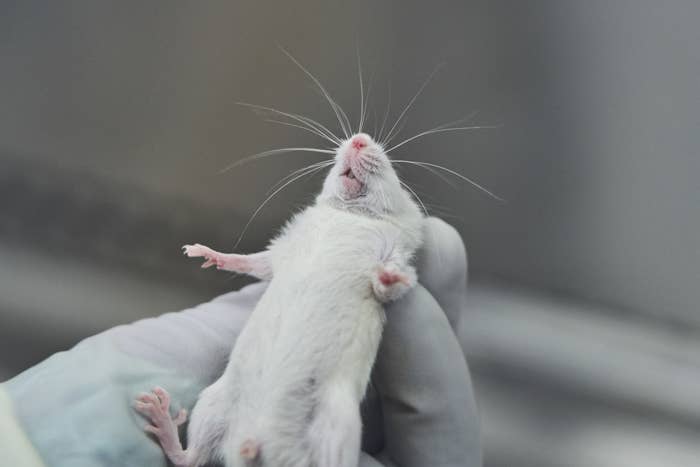
The journalists at BuzzFeed News are proud to bring you trustworthy and relevant reporting about the coronavirus. To help keep this news free, become a member and sign up for our newsletter, Incoming.
A Trump administration fetal tissue ethics panel voted to scrap 13 of 14 National Institutes of Health medical research proposals already approved for federal funding by scientists, according to a newly released report.
The NIH “Fetal Tissue Research Ethics Advisory Board” was announced more than a year ago, part of a broad Trump administration move to curtail federal research involving fetal cells, which are widely used in medical research but have become a flashpoint for abortion opponents in the last decade. The ethics board’s membership was not revealed until the morning of its first meeting on July 31, when it became clear the Trump administration had stacked it with abortion opponents.
Headed by bioethicist Paige Comstock Cunningham, interim president of the evangelical Taylor University in Indiana, the panel overwhelmingly voted to nix the proposals for research involving fetal cells, the new report revealed. Because of confidentiality rules, the substance of each proposal was not disclosed, only the nature of the discussions and votes. The only proposal that received a majority of votes needed to be funded used cells already in a repository and was aimed at developing alternatives to using fetal cells.
The votes now go directly to Department of Health and Human Services head Alex Azar for final decisions on the funding of the proposals, sidelining NIH chief Francis Collins. If Azar sits on the report and takes no action by November when federal funding cycles end, he would effectively deny the proposals funding, the Washington Post noted. By law, Azar can only overrule the panel's votes if he concludes from the report that they were made in an "arbitrary and capricious" manner.
Human fetal tissue cultures, cells derived from abortions, have been widely used in medical research and in vaccines for decades, with rules codifying their use erected in the early 1990s. At least half a dozen current coronavirus vaccine candidates use the cells, widely seen as a “gold standard” for tissue studies in many fields including AIDS research, according to a July 28 letter sent to the ethics panel by more than 90 scientific organizations.
Research advocates condemned the vote to nix the research grants, calling the ethics board’s decision an imposition of anti-abortion politics into medical research.
“At a time when the US and the world should be employing every biomedical research avenue to fight the COVID-19 pandemic, a crucial tool for investigating viral diseases has been blocked by special interests,” International Society for Stem Cell Research president Christine Mummery said in a statement. “People may die unnecessarily because the administration has allowed an ideological special interest group to hijack biomedical research.”
Meanwhile, abortion opponents applauded the result. Mallory Quigley of the Susan B. Anthony List said in a statement that the panel “was a serious review of the ethical considerations surrounding use of human fetal tissue in research.”
By charter, the panel is required to have only a third of its members be scientists, with other slots set aside for lawyers, doctors, and theologians. At least 10 of the board’s 15 members were opponents of abortion, fetal tissue science, or related research, according to Science Magazine, while only one member, neuroscientist Lawrence Goldstein of the University of California, San Diego, has spoken in favor of fetal tissue research.
Many of the objections to proposals described in the report revolved around the completeness of tissue donation consent forms. Although the panel was not supposed to evaluate the scientific merits of the proposals, many objections involved contentions that the amount of tissue required was excessive or that fetal tissues from spontaneous miscarriages could instead be substituted for ones from abortions.
“Miscarriages are useless for this research,” Stanford developmental biologist Irving Weissman told BuzzFeed News in response, noting the implausibility of asking a woman who just had a miscarriage to provide the cells under sterile conditions and the difficulty in retrieving living cells. "Its a non-starter."
"This was not about science or the health of born humans in the USA and in the World,” Weissman added by email. “It was about imposing religious beliefs strongly held by a distinct minority of people in the US on the rest of us, even though it will surely result in disease and deaths.”
Two board members wrote a dissenting opinion for the report, stating: “This board was clearly constituted …so as to include a large majority of members who are on the public record as being opposed to human fetal tissue research of any type. This was clearly an attempt to block funding of as many contracts and grants as possible.” The dissenters noted that panel members had even voted against proposals aimed at developing “humanized” mouse cell alternatives to human fetal tissue. These votes “will paradoxically fail to reduce the use of human fetal tissue in the development of humanized mice needed for therapy development including for COVID-19,” they wrote.
NIH did not provide a statement about the status of its research grants with the release of the July meeting report.
“The lack of NIH leadership to call attention to all of this is puzzling but understandable,” said Weissman. In the past, NIH officials could take a strong principled stand, and be fired or resign knowing there were many experts to replace them and keep research and clinical trials going.
“But virtually every person replaced by Trump and his administration has only one quality — complete loyalty to him — not domain expertise,” Weissman said. “So I can understand the personal ethical dilemma of keeping silent on some issues to protect the larger goals.”
With the presidential election coming up on November 3, the panel's vote represents a promise made by the Trump administration to abortion opponents, who widely voted for him in 2016, Heather Pierce of the Association of American Medical Colleges, told BuzzFeed News. "This panel is certainly a political move."
As well as discouraging scientists from pursuing research that could help fight diseases right now, the administration's moves against human fetal tissue research raise concern about more such clashes in the future, said science policy expert Kevin Wilson of the American Society for Cell Biology.
"My concern would be that under a second Trump administration, the attacks on science will go beyond what we've seen already."
UPDATE
This post has been updated with comments from representatives of the Association of American Medical Colleges and American Society for Cell Biology, as well as a link to the law governing federal advisory committees.

